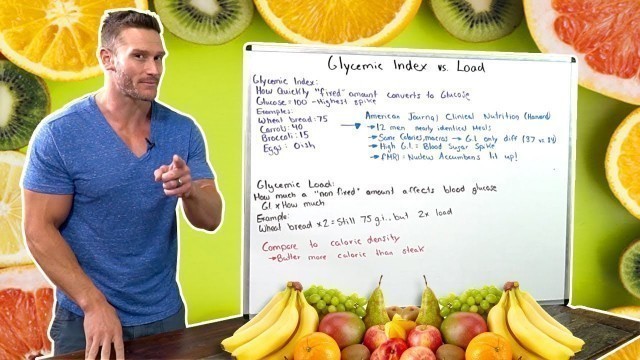

'Click Here to Subscribe: http://Bit.ly/ThomasVid Get MY groceries at MY price with Thrive Market: http://ThriveMarket.com/ThomasDeLauer My Website: http://ThomasDeLauer.com Top 3 Safest Carbs (Low Glycemic and Gluten Free): https://www.youtube.com/watch?v=j0QmUup77i0 Keto and Fasting vs. Blood Sugar | Ketone Production | Glucose: https://www.youtube.com/watch?v=q74l-ecOi_8 Ketogenic Diet: Low Carbs vs. Slow Carbs | How to Balance: https://www.youtube.com/watch?v=CuUdle3cfdA Glycemic Index vs Glycemic Load: Nutrition Basics - Thomas DeLauer Special Thanks to my team and Nicholas Norwitz - Oxford Ketone PhD Researcher and Harvard Med Student - for working diligently on research as well! So glycemic index is how quickly a fixed amount of food or carbohydrates get converted into glucose. So it\'s if you have one specific amount, how quickly does that elevate your blood sugar and get converted into glucose. So for example, glucose is 100. It\'s the highest point that you can get to. So for example, wheat bread is a 75. Carrots are a 40. Broccoli is a 15. And eggs are a zero. That\'s just how you measure sort of the carbohydrate glucose density of something. So The American Journal of Clinical Nutrition published a study that was done out of Harvard. Took a look at 12 men, gave them nearly identical meals. So literally they ate the same meal, same calories, the same macronutrients, same proteins, fats and carbs. The only difference was the glycemic index was 37 in one group, and was 84 in another. https://www.ncbi.nlm.nih.gov/pubmed/23803881 So high glycemic versus low glycemic. The participants didn\'t even know their food was different. Now what they found is that the high glycemic index caused a big blood sugar spike and then a strong dip below baseline three hours later. But when they looked at their brains under fMRI, they found that the nucleus accumbens was lit up like a Christmas tree. The nucleus accumbens is the part that is associated with addiction. So we definitely saw that even when food tastes the same, higher glycemic index will make you more addicted to it. So that\'s why you want to avoid high glycemic foods. You want to go low GI, even if it\'s comparable foods otherwise. Now what\'s glycemic load? See, people interchange them and they get them mixed up. Glycemic load is how much a non-fixed amount affects your blood glucose. So again, it\'s basically our glycemic index multiplied by how much you eat. So we use that same example of wheat bread. Wheat bread is, no matter what, going to be a 75. Whether you eat one piece of wheat bread or a hundred pieces of wheat bread, it\'s still the same glycemic index. It still spikes your blood sugar at the same rate of speed. But glycemic load ends up factoring in how much of it there is. So in this case, wheat bread times two, still 75 GI, but two times the load. The best way to compare it is like caloric density. We look at one piece of food compared to another and we say, oh, well that\'s more calorically dense than the other. So a simple thing it\'d be like a square of butter might have just as many calories as an entire steak. But it\'s because the butter is more calorically dense than the steak. So it\'s all about balancing this glycemic index and this glycemic load. So when you look at glycemic load at that number, you want to understand, well, how much of this food is making how much of an impact in my body. So you should always look at glycemic index and glycemic load because this can carry you over for a longer period of time. Nicholas Norwitz - Oxford Ketone PhD Researcher and Harvard Med Student: https://www.dpag.ox.ac.uk/team/nicholas-norwitz'
Tags: Weight loss , intermittent fasting , keto , Blood Sugar , Thomas DeLauer , blood glucose , glycemic index , glycemic index vs glycemic load , glycemic index explained , glycemic index and glycemic load , glycemic load , glycemic load vs glycemic index , glycemic load and index , glycemic load diet , glycemic load explained , difference between glycemic index and glycemic load , carbs and glycemic index , glycemic load keto , glycemic load ketosis , glycemic load keto diet
See also:

!['Fashion Dress Women Fashion [2018 Best Sellers]: Black Lace Shrug Bolero, Cropped Jacket Short'](https://cdn-img01.abouthomedesignvideo.com/images/31-m/145/1453350_m.jpg)















comments